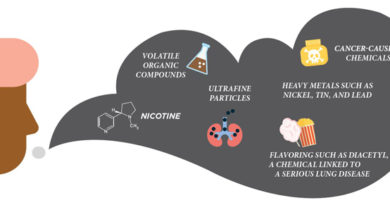Is Vaping Nicotine Bad for You?
With the rise of vaping popularity and increase in news about the health impact of vaping, is vaping nicotine bad for you? Sure, you may have seen news that health authorities may admit vaping is healthier than smoking, but that’s a fairly low bar. Dig a bit deeper to make an informed choice about the impact of vaping upon your health.
How is Vaping Nicotine Bad for You?
When you vape nicotine, you inhale a vapor that your vaping device’s heating element generates from a solution that contains a base, flavorings, and of course, nicotine. You won’t get the carbon dioxide, tar, and other really toxic elements of a regular cigarette.
If you’re a smoker, nobody probably needs to tell you that nicotine is an addictive substance, and if you don’t already use nicotine, you’re wise to stay away from it. Trust us, nobody plans to get addicted to nicotine.
Experts Say Vaping is Less Risky Than Smoking
At the same time, even Johns Hopkins admits that vaping nicotine is almost certainly less risky than inhaling thousands of toxic chemicals from a traditional cigarette. Still, researchers admit that they don’t have long-term studies of the health effects of vaping because they haven’t been around that long and also because these kinds of studies just haven’t been conducted very often.
Is Nicotine Bad for You?
Still, it’s fair to consider the negative effects of using any sort of nicotine:
- People get addicted to nicotine, and some people are more prone to this than others. Experiencing nicotine withdrawal isn’t fun at all, and sadly, few people can just quit without help.
- Nicotine does raise blood pressure and spike adrenaline. While nicotine isn’t really the most dangerous chemical in cigarettes, it can increase the risk of heart attacks, particularly in more vulnerable people.
- Nicotine may also impair brain development, so it’s certainly bad for young people.
You may have seen statements that claim that nicotine isn’t any worse than caffeine. Studies have even demonstrated that coffee drinkers may live longer because of other protective substances in the drink, despite caffeine. On the other hand, researchers have found that nicotine is much more addictive and riskier to use than caffeine.
Here again, if you don’t currently use nicotine and especially if you’re pregnant or not an adult, you need to stay away. On the other hand, many other stop-smoking therapies contain nicotine, don’t address the addiction, and sadly, don’t appear to work as well as vaping to help people quit smoking.
Bottom line: If you’re an adult smoker without grave health issues and are not pregnant, you will probably improve your health by switching from cigarettes to vaping. At least, you won’t smell so bad or expose other people to second-hand smoke. Vapor doesn’t produce much of an odor and may simply smell like the flavoring used. Naturally, this is not medical advice, so you should raise any concerns you have with your doctor.
What Else is In Your Vaping Liquid?
If you buy vape or make your own vape liquid, you usually get vaping liquid, flavor, and nicotine. This article already addressed nicotine, but you should also consider the safety of inhaling vapor from the base and the flavor.
First, most commercial vaping liquids don’t include the exact formula they use upon the label. Besides nicotine, nicotine vape juice usually contains these ingredients:
- The base: Typical bases include a solution of propylene glycol and/or vegetable glycerin. These are usually abbreviated as PG and VG in the vaping world. Both PG and VG are considered safe to eat but may be irritating to inhale, particularly for people who already have lung diseases. At the same time, inhalers often us PG to deliver medication to people with asthma and other lung diseases. Some people may be allergic to these substances as well.
- Flavors: E-juice flavors could range from actual tobacco flavor to fruit to spires to coffee. Some concern has been raised about a common ingredient called diacetyl. This chemical can create a buttery taste in such products as popcorn, and it’s considered safe to eat but not-so-safe to inhale, especially in large doses. For instance, diacetyl has been blamed for the incurable disease, popcorn lung, in workers in a microwave popcorn factory.
As a note, PG allergies are not that common. Still, you can find vaping juices that don’t contain PG if it’s a problem for you. You can also buy vegetable glycerine, or VG, and make your own vaping liquid. Also, vaping can be dehydrating, so it’s always a good idea to keep yourself hydrated while you’re vaping.
Is Vaping Nicotine Bad for You?
The former smokers and current vapers can tell you that nicotine is incredibly addictive. Even more, the habits of smoking and vaping may be hard to stop for psychological reasons. The long-term health effects of vaping are largely unknown because few people have been vaping that long and there also appears to be a shortage of true scientific studies.
At the same time, people who already use nicotine may find that vaping provides them with a less risky and less smelly alternative to smoking cigarettes. Certainly, you should do some research about the kinds of e-liquids that you use and consider that in light of your unique health situation. If you can’t trust commercial vaping liquid, you could always buy the supplies you need to make your own.



